PRANAYAM
Bhastrika Pranayam
Steps: In Bhastrika, start with deeply breathe in and slowly breathe out through nose continue this process for at least 7-10 minutes.
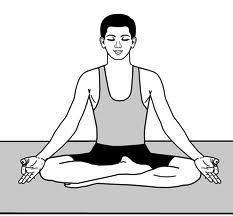
Benefits:
Reduce lungs problem, cures asthma & sinus .
Increases lungs capacity .
Boosts the supply of oxygen and purifies blood
Improve respiratory system.
It removes blockages in the nose and chest.
Caution
People suffering from high blood pressure and heart diseases do it little slowly.
People suffering from ulcers, dehydration should avoid this pranayam.
Kapalbhati Pranayam
Steps: In kapalbhati, it's a process of breathing out through nose and the time you are breathing out your stomach should pump inside. Kapalbhati should be done slowly one stroke in one second. (10 minutes.)
Benefits: 
Effective for diabetes problem.
Increases digestive power.and reduces problem of gastric , acidity and indigestion.
Effective for sinus, cough and cold.
Reduces gas & acidity problems and obesity.
Help reduces stomach fat
Reduce lungs, liver, kidneys problem,
Caution
People suffering from high blood pressure and heart diseases do it little slowly.
People suffering from ulcers, dehydration should avoid this pranayam.
Pregnant ladies and people suffering from stomach related issues like ulcers,hernia, appendix or done any kind of surgery (after 3 months) should avoid doing this pranayama
Anulom-Vilom Pranayam
Steps:
Anulom-Vilom is a process in which first you have to close your right nostril from your thumb and breathe in from your left nostril then close your left nostril and breathe out from the right one after this breathe in from the same nostril you exhaled. This process has to be continued for at least 7 - 10 minutes.
Benefits 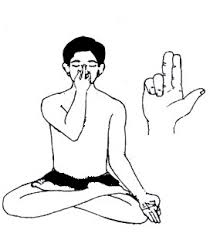
Cleans up (72210 nadis) and tones up the entire nervous system, hence good for curing paralysis.
Control blood pressure.
It is also beneficial in migraine and chronic sinus problems.
It strengthens the heart. Improves blood circulation and breathing capacity.
Practice of Anulom Vilom Pranayam removes mental tension and worries.
It keeps the mind calm, peaceful and cheerful and helps in overcoming depression.
_________________________________________________________________
Bhramari Pranayam
Steps:
Bhramari is a process in which index finger has to be placed on forehead, thumbs has to be kept in your ears and has to be pushed gently so that no outer noise can be heard now the rest three fingers has to be kept on your eyes like a covering cap. After taking the position deeply breathe in from your nose and breathe out making a humming sound like a bee through your nose.
Benefits:
Instant way to relieve tension, anger and anxiety. It is a very effective breathing technique for people suffering from hypertension as it calms down the agitated mind.
Helps to cure migraines & depression
Improves concentration and memory power.
It can cure insomnia.
Helps in reducing blood pressure
Beneficial for paralysis and parkinson patients .
Improve brain functions.
Udgeet Pranayam
Steps:
First take deep breathe in through nose then breathe out by chanting OM, breathe out till last level of your breathe .
Benefits:
Helps to increase your concentration.
Helps to control emotion like anger and fear
Helps to improve your voice.
Helps to clean your throat.
Reduces stress.
Chanting OM will help you to get rid of negative dreams.
********
ASANAS
Kandarasan
Steps:
Start with your hands and leg straight on floor, then fold your both leg touching to your buttocks,try to catch your ankles with your hands. Now breathe in and lift your stomach from neck to knee and hold as per your comfort.
Benefits:
Kandrasan helps to improve spine flexiblity.
Effective for women suffering from menstrual disorder and uterus problems.
Cures back pain.
It improves digestion by stretching.
Cautions:
Avoid this posture if you have a neck & Knee injury
Caution for late term pregnancy.
__________________________________________________________________________________
Kamarchakrasan
Steps :
Start with your hands and legs straight on the floor,Inhale and fold your both legs,Then exhale & bend your legs on right side and head on left side simultaneously,Repeat the same on the left hand side.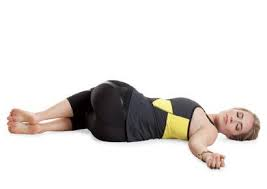
Benefits:
Improve flexibility of lower back.
Practice of this asana regularly helps in improvement of digestion by stretching.
It helps in development of mind and body
Helps in body relaxation.
Cautions:
People with Heart, abdominal or brain surgeries should not practice this asana.
Pavanmuktasana
Steps:
Start with your hands and legs straight on floor, then inhale and fold your both leg and bring it towards your chest pulling from your hand now breathe out and lift your head and touch your nose to the knee.Hold the position as per your comfort.
Benefits: 
Helps in faster weight loss.
Helps in strengthening abdominal muscles.
Improves flexibility of lower back.
Relieves Constipation.
Very effective for gas problem.
Helps your body functioning better for doing everyday tasks.
Cautions :
Spondylitis & knee pain
_________________________________________________________
90 Degree (Ardha Halasana)
Steps:
Start with your legs and hands straight on the floor. Now keep your hands below your buttocks and raise your both leg in a 90 degree angle and slowly move it down towards the ground make sure that your feet doesn’t touch the ground. Hold the position as per your comfort. You can also practise this asana with single leg.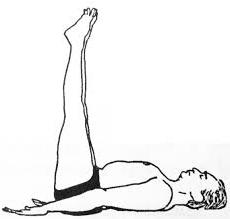
Benefits:
Helps regulate bowel movement
It help to build up elasticity of the abdominal area.
Helps in reducing things fat.
Also reduces stomach fat
Makes your lower back flexible.
Reduce lower body fat
Cautions:-
Should be avoided during pregnancy and menstruation, high blood pressure.
Should be avoided if suffering from an ENLARGED liver HERNIA as well as slip disc and weak blood vessels in the eyes.
Naukasana
Steps:
Start with your legs and hands straight on the floor. Inhale and raise your leg in a 60 degree angle then exhale and lift up your upper body and try to touch your feet from your hand. This can also be done firstly with alternate legs. Hold the posture as per your comfort.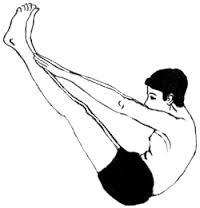
Benefits:
This asana is perfect for weight loss.
Increases your body stamina and flexibility.
Stimulates nerves and hormonal systems.
Bringing about deep relaxation.
Good for diabetes patient to maintain sugar level.
Cautions :
Should be avoided during pregnancy and menstruation, high blood pressure.
Should be avoided if suffering from an ENLARGED liver HERNIA as well as cervical spondylitis, slip disc and weak blood vessels in the eyes.
________________________________________________________
Crunches (Hasta Merudandasana)
Steps:
Lie down on your back .Then joint and fold your legs keep your hand straight upside facing towards the ceiling. Then exhale and bring your upper body to your knees. This can be done continuous and fast.It is also called Crunches.

Benefits:
Helps you to improve Core strength and stability.
Increases your stamina.
Helps your body to be perfect and fit.
Helps in improvement of lower back , buttocks and abdomen.
Helps in reducing fat of buttocks and abdomen area.
This exercise also improves your muscle strength & flexibility.
Cautions :
Should be avoided during pregnancy and menstruation, high blood pressure.
Should be avoided if suffering from an ENLARGED liver HERNIA as well as cervical spondylitis, slip disc, and weak blood vessels in the eyes.
Circle (Padvritasan)
Steps:
Start with your legs and hands straight on the floor. Then lift your both leg keeping your hands below your buttocks then make circle clockwise and anticlockwise. Try to make big circles . You can also do this with your single leg. Do counts as per comfort.
Benefits:
Helps in faster weight loss.
Reduces fat around the abdomen muscles
Helps in strengthening your abdominal muscles.
It improves the activity of abdomen and intestine.
Increases your stamina and flexibility.
It helps in curing constipation.
Cautions :
Should be avoided during pregnancy and menstruation, high blood pressure.
Should be avoided if suffering from an ENLARGED liver HERNIA as well as slip disc and weak blood vessels in the eye
_________________________________________________________
Cycling (Dwichakrikasan)
Steps:
Start with your legs and hands straight on the floor. Then fold your both leg and lift it towards your body then start cycling first alternate then both leg joined, you can practise this asana fast and can do counts according to your comfort.

Benefits:
This asana is perfect for faster weight loss.
Increases your body stamina and flexibility.
Reduces fats of thighs and calf.
It makes your digestion power strong.
It helps in reducing stomach and upper stomach fat.
Cautions :
Should be avoided during pregnancy and menstruation, high blood pressure.
Should be avoided if suffering from an ENLARGED liver HERNIA as well as slip disc, and weak blood vessels in the eyes.
Makarasana
Steps:
Lie down on your stomach and keep your hands below your chin with elbow straight on the floor and start moving your legs up and down from buttocks to the floor alternately. You can also try this with your both legs.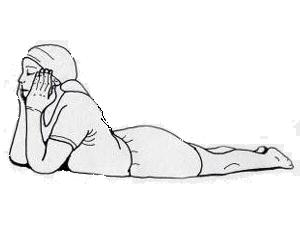
Benefits:
It reduces thighs and buttocks fat.
It relaxes the muscles of the body.
It helps in treating hypertension.
It helps to cure heart diseases.
It helps in relieving tensions of the body and mind.
Cautions :
Pregnant ladies should avoid this asana.
________________________________________________________________________________
Bhujangasana
Steps:
Lie down on stomach, hands should be kept near your chest. Inhale and lift your upper body till navel. Hold as per your comfort.

Benefits:
It helps to make your arms strong
Strengthens arms and shoulders.
Improves menstrual irregularities.
Stretching the muscles of shoulders,chest and the abdominal area and reduces lower back pain
Opens the chest & helps to clear the passages of heart and lungs.
Caution:
Avoid if have any injuries in neck ,back or in arms,Pregnant ladies should avoid this asana,ulcer and hernia patients also avoid this asana,People with any kind of surgery can practise this asana after 90 days.
Ardha Bhujangasana
Steps:
Lie down on stomach, hands should be kept near your chest. Inhale and lift your upper body till navel. Hold as per your comfort.
Benefits: 
Stretching the muscles of shoulders, chest and the abdominal area.
It helps in toning the buttocks.
Stimulating the organs in the abdomen.
Clearing passages of the heart and lungs.
This asana tone ups spine and expands the chest.
Caution:
Avoid if have any injuries in neck ,back or in arms,Pregnant ladies should avoid this asana,ulcer and hernia patients also avoid this asana.
People with any kind of surgery can practise this asana after 90 days.
________________________________________________________________________________
Naukasan (On Stomach)
Steps:
Lie down on stomach, keep your hands straight upside on the floor passing to your head. Breathe in and raise your upper and lower body straight and try to be on your stomach raise your hands and legs as possible as you can. Hold as per your comfort.
Benefits:
Reduces stomach fat.
Stretches lungs and chest.
Reduces your fat and helps your to be fit.
Increases digestive power.
Reduces over all fat of your body.
Caution:
Avoid if have any injuries in neck ,back or in arms,Pregnant ladies should avoid this asana,ulcer and hernia patients also avoid this asana,People with any kind of surgery can practise this asana after 90 days.
Salabhasana
Steps:
Lie down on stomach, keep your hands below your thighs and raise your legs upside. You can practise this asana with alternate leg and both leg as well. You can also hold as per your comfort.
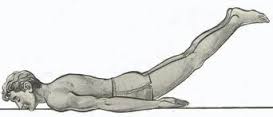
Benefits:
Provides strength to lower back muscles.
Helps in firming your buttocks.
Helps in reducing lower back problems.
Helps in flexibility of spine.
Reduces thighs and buttocks fat.
Caution:
Pregnant ladies should avoid this asana,Ulcer and hernia patients also avoid this asana.
People with any kind of surgery can practise this asana after 90 days.
_________________________________________________________________________________
Dhanurasana
Steps:
Lie down on your stomach, fold your both legs backside towards the buttocks and now take your both hands back and try to catch your ankle. Now pull your leg upside and try to lift your upper body. This will make an exact shape of a bow. Hold as per your comfort.

Benefits:
Effective in weight loss
Improves digestion and appetite
Helps to cure dyspepsia (obesity),
rheumatism and gastrointestinal problems.
Cures constipation.
Gives flexibility to the back.
Cautions :
Ladies should not practice this asana during pregnancy ,menstruation,High blood pressure,Hernia,abdomen surgery.
Majarasana
Steps:
First sit in vajrasana, elbow touching to your knees ,keep your palms on the floor then get up on the base of your palms .The pose will form like a cat. Then inhale and look up towards the ceiling and push you back down now exhale and look down towards your navel and push your back towards upside .
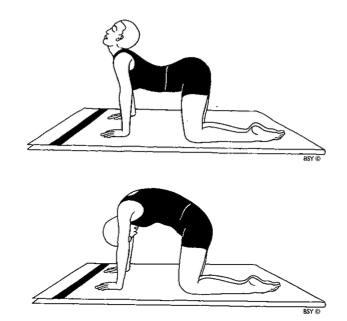
Benefits:
Very effective for back pain.
Increases spine flexibility.
It also helps in increasing memory power and concentration.
Stretches the hips, abdomen and back.
Improves posture and balance.
Cautions :
Spondylitis and Knee pain.
***********
Surya Namaskar
Steps:
Tones up the digestive system by the alternate stretching and compression of abdominal organs. It activates digestion and gets rid of constipation and dyspepsia.
Benefits:
Reduce all body weight.
Improves digestive system.
Improves blood circulation.
Increases stamina.
Tones up your body & make your body flexible.
Helps in strengthening muscles and joints.
It helps regulate menstrual cycles.
Gives proper moves & postures for doing any asan.
Prevents skin disorders and gives glowing skin.
Brings down your blood sugar levels and help keep heart diseases at bay.
Cautions :
Pregnant women should not practice this after third month of pregnancy.
Arthritis patient should avoid surya namaskar.
Back pain patient should avoid surya namaskar.
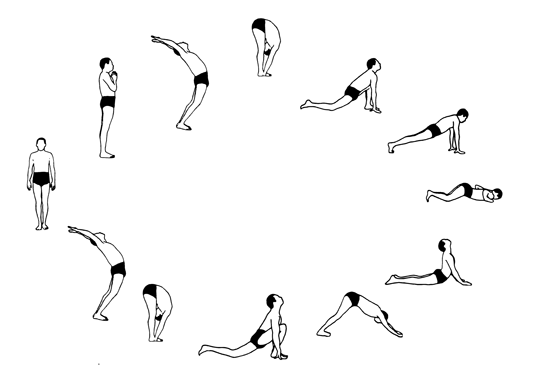
*********
Diseases
What is obesity ?
Weight gain is one of the core reasons for many diseases like High Blood pressure,joint pain,heart disease,Type 2 diabetes. Obesity is most commonly caused by a combination of excessive food intake, lack of physical activity, and genetic imbalance,lack of exercise and dietary issues.
More Effective :-
Surya Namaskar ( 20 -50 times )
All heavy asanas (15-20 times)
Kapalbhati Pranayam (700-1000 times).
Jogging to be done daily ( 15-20 mins )
Cautions :-
Nothing to avoid.
------------------------------------------------------------------------------------------------------------------------------------
Diabetes
What is Diabetes?
Diabetes is condition in which body does not produce sufficient insulin or use it properly. So it leads to high glucose in blood.
More Effective:-
Kapalbhati Pranayam (700 – 1000 times)
Naukasana (10-15 times)
Pavanmuktasana (10 times)
Mandukasana (5times)
Circle (10-15 times)
Cycling (10-15 times).
More & More heavy work out according to client capacity.
Cautions :
Nothing to avoid but make sure provide workout according to client capacity
Blood Pressure
What is Hypertension?
High blood pressure is a common condition in which the force of the blood against your artery walls is high enough that it may eventually cause health problems, such as heart disease.

More Effective:-
Bhastrika Pranayam ( 2 sets of 50-50 )
Anulom- Vilom Pranayam ( 2 sets of 50-50 )
Brahmari Pranayam & Udgeet Pranayam ( 5 times each )
Shitali / shitkari Pranayam ( 10 – 20 times )
Pawanmuktasana (10–20times)
Shavasana
Avoid:-
Slow or Avoid Kapalbhati Pranayam.
Slow or Avoid Suryanamaskar
Cautions:-
Avoid Heavy work out.
---------------------------------------------------------------------------------------------------------------------------------------
Asthma
What is Asthma?
Asthma is the condition where the air passage in the lungs become inflamed. The air passages are the airways that carry air in and out of the lungs. When the air passages get inflamed, it becomes red and swollen and it is difficult to breathe. This results in Coughing, wheezing, shortness of breath and a tight feeling in the chest. Asthmatic attacks can be triggered by allergies, exercise, cold air, pollution and stress related disorders.

More Effective:-
Bhastrika & Anulom- Vilom ( 2 sets of 50-50 )
Brahmari Pranayam & Udgeet ( 5 times each )
Shitali / shitkari Pranayam ( 10 – 20 times )
Pawanmuktasana (10– 20times)
Shavasana
Avoid:-
Slow or Avoid Kapalbhati Pranayam.
Slow or Avoid Suryanamaskar
Cautions:-
Avoid Heavy work out.
What is Arthritis?
Arthritis is a condition characterized by stiffness and swelling of the Joints. While you may only experience mild discomfort at the outset, the symptoms can become debilitating over time. Your risk for arthritis can increase with age, but it’s not an elderly person’s disease. Furthermore, there are different risk factors Associated with different types of arthritis. Understanding the causes and risk factors can help you and your doctor take preventive measures in advance.

In Arthritis, person has to practice very light exercise of joints which includes in warm ups and with more and more pranayams.
More Effective:-
All Pranayam
Light warm up
More stretching.
Cautions:-
Avoid heavy workout.
----------------------------------------------------------------------------------------------------------------------------------------
Migraine
What is Migraine?
Migraine is a chronic neurological disease with intense headache and pulsing sensation in one area of the head and is commonly accompanied by nausea, vomiting, and extreme sensitivity to light and sound.
More Effective :- 
Bhastrika pranayam (2 sets of 50-50)
Bhramari & Udgeeth pranayam (OM) (5 times)
Anulom Vilom pranayam (2 sets of 50-50)
Shavasana
Cautions:-
Avoid heavy workout.
What is Back pain?
Back pain is a very common disorder that leads to severe pain in the muscles and bones of the lower back. The pain can be classified as to more than 6 weeks time OR in some cases more than 12 weeks which is considered as Chronic back pain.

More Effective :-
Kandharasana ( 10-20 times )
Kamarchakra asana ( 10 - 20 times )
Bhujangasana ( 10 - 20 times )
Ardha- Bhujangasana ( 10 - 20 times )
Pawanmuktasana ( 10 - 20 times )
Majarasana (10-15 times)
Ustrasana (10-15 times)
Matsyasana ( 10 - 20 times )
Avoid:-
Naukasana.
Crunches.
Dhanurasana.
Both legs 90 Degree, circle, cycling
Cautions:-
Don’t allow client bending forward
---------------------------------------------------------------------------------------------------------------------------------------
Spondylitis
What is Spondylitis?
Spondylitis is an inflammation of the spine or the backbone. Spondylitis is one of the common causes of back & neck pain. This pain is usually around the cervical region of neck, shoulder and lower spine, with downward-moving stinging pain.
More Effective :-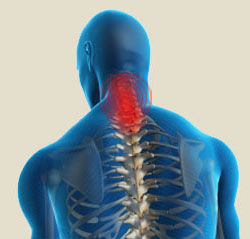
Bhujangasana & Matsyasana(10 - 20 times)
Majarasana & Kandrasan ( 10 - 15 times )
Kamarchakrasan (10-15 times)
Ardha- Bhujangasana ( 10 - 20 times )
Pawanmuktasana & Ustrasana(10-20 times )
Avoid:-
Naukasana.
Crunches.
Dhanurasana.
Cautions:-
Don’t allow client bending forward
Slip Disc
What is Slip Disc?
The spinal column is made of up 26 bones which are cushioned by disks. The disks protect the bones by absorbing the shocks from daily activities like walking, lifting, and twisting. Slipped disk is a condition in which a disk in the spinal column becomes displaced from its normal position.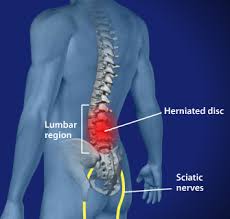
More Effective :-
Bhujangasana ( 10 – 20 times )
Majarasana ( 10 – 20 times )
Salabhasana ( 10 – 20 times )
Matsyasana ( 10 - 20 times )
Kandrasan (10-15 times)
Kamarchakrasan (10-15 times)
Ardha- Bhujangasana ( 10 - 20 times )
Pawanmuktasana ( 10 - 20 times )
Ustrasana (10-15 times)
Avoid:-
Naukasana.
Crunches.
Dhanurasana.
Both legs 90 Degree, circle, cycling
Cautions:-
Don’t allow client bending forward
---------------------------------------------------------------------------------------------------------------------------------------
Sinus(Cold)
What is Sinusitis?
Sinusitis means your sinuses are inflamed. The reason can be an infection or another problem. Your sinuses are hollow air spaces within the bones surrounding the nose. They produce mucus, which drains into the nose. If your nose is swollen, this can block the sinuses and cause pain. Normally a person suffering from sinusitis has difficulty in breathing and continues to have swelling.
More Effective :- 
Anulom Vilom & Bhastrika (2sets of 30-30 )
Kapalbhati Pranayam (700-1000 times)
Ardha kapalbhati (500-700 times)
Avoid:-
Shitli pranayam
Shitkari Pranayam
Cautions:-
Avoid Rice & Curd.
Knee Pain
What is Knee pain?
Knee pain is a common problem among many people which refers to pain in knee joints.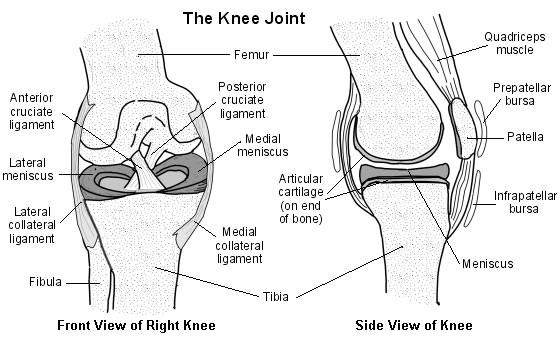
More Effective:-
All Pranayam
Light exercises legs( 10 - 20 times )
Avoid:-
Surya Namaskar
Cautions:-
Dont give more pressure on knees
_________________________________________________________
Cholesterol
What is Cholesterol?
Cholesterol is found in every cell of the body. It is manufactured by the body but can also be taken in from food. It is waxy and fat-like in appearance. High cholesterol is a major reason for heart-attack. Our body needs good cholesterol which is HDL and should avoid buildup of LDL cholesterol.

More Effective :-
Anulom vilom pranayam (2sets of 30-30times )
Kapalbhati pranayam ( 00-1000 times )
Surya Namaskar ( 10 - 20 times )
Naukasana ( 10 - 20 times )
Viparita Naukasana ( 10 - 20 times )
Dhanurasana (5 -7 times)
Sarvangasana (5-7 times)
Cautions:-
Avoid Junk food & oily food.
What is Heart Disease?
Heart Disease Is Also Known As Cardiovascular Disease. The Disease Refers To Any Default In The Cardiovascular System Of A Person From Various Factors. The Heart Plays Important Role In Our Body Which Pumps The Blood Throughout The Blood Vessels Continuously. The Most Common Type Of Heart Disease Is Coronary Artery Disease Which Begins Due To Blockage In Heart Arteries As A Result Of Reduced Blood Flow And Can Proceed To Heart Attack OR Heart Failure.
More Effective :-
Bhastrika Pranayama ( 30 - 70 times )
Anulom Vilom pranayam ( 40 - 60 times )
Bhramari & Udgeeth Pranayama ( 5 times each )
Savasana ( 5 - 10 mins daily )
Avoid:-
Naukasana
Kapalbhati Pranayam
Cautions:-
Dont allow client to bend forward
___________________________________________________________________
Thyroid
What is Thyroid?
The thyroid gland produces the hormone that influences almost all of the metabolic processes in your body. Thyroid disorders are a state where either the thyroid is not able to secrete enough hormones for the metabolism process OR the quality of the hormone is not good enough to continue and can range from a small, harmless goiter and in acute cases can lead to cancer.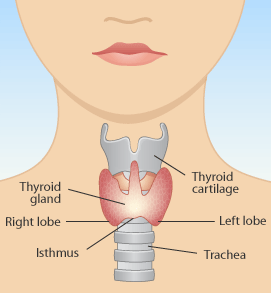
More Effective :-
Ujjayi Pranayama ( 30 - 50 times )
Neck exercises ( 5 - 10 times )
Kapalbhati (500-700 times)
Halasana (5times)
Sarwangasana (5times)
Matsyasana ( 10 - 20 times )
Singhasana (5-10 times)
Supta Vajrasana (5-10 times)
Cautions:-
Junk food & oily food.
Vertigo
What is Vertigo?
Vertigo is a sense of rotation, rocking, or the world spinning, experienced even when someone is perfectly still.Many children attempt to create a sense of vertigo by spinning around for a time; this type of induced vertigo lasts for a few moments and then disappears. In comparison, when vertigo occurs spontaneously or as a result of an injury it tends to last for many hours or even days before resolving.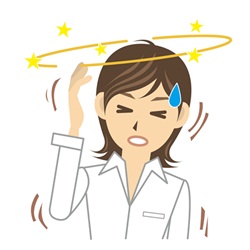
More Effective :-
Anulom - Vilom & Bastrika Pranayam (2 sets of 50-50)
Bhramari & Udgit Pranayam (10 to 15 times )
Jalandhar bandh (7 to 10 times Hold for few seconds )
Mulabandha (7 to 10 times Hold for few seconds )
Halasan & Sarvangasana (5 times)
Avoid:-
Surya Namaskar
Cautions:-
Avoid heavy workout.
___________________________________________________________________
Parkinson’s Disease
What is Parkinson’s
Parkinson's disease is a progressive nervous system disorder that affects how the person moves, including how they speak and write. Symptoms develop gradually, and may start off with ever-so-slight tremors in one hand. People with Parkinson's disease also experience stiffness and find they cannot carry out movements as rapidly as before - this is called bradykinesia. The muscles of a person with Parkinson's become weaker and the individual may assume an unusual posture.
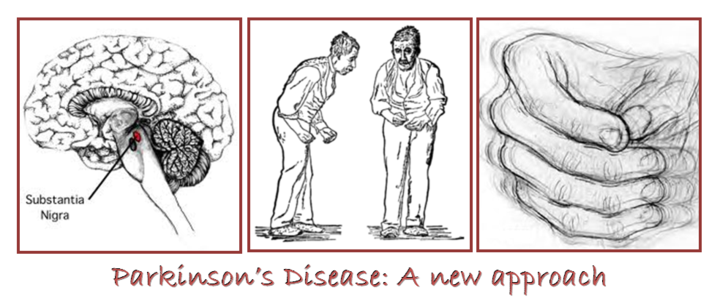
More Effective :-
Kapalbhati Pranayam( 3 to 5 minutes )
Anulom-vilom & Bhastrika ( 5 to 10 minutes)
Bhramari pranayam ( 10 to 15 times )
Om chant (10 to 15 times )
Mula Bandha (10 to 15 times with hold)
Light exercises (10-15 min)
Avoid:-
All Asanas
Cautions:-
Avoid heavy workout
Insomnia
What is Insomnia ?
Insomnia is a common sleep disorder that can make it hard to fall asleep, hard to stay asleep, or cause you to wake up too early and not be able to get back to sleep. You may still feel tired when you wake up. Insomnia can sap not only your energy level and mood but also your health, work performance and quality of life.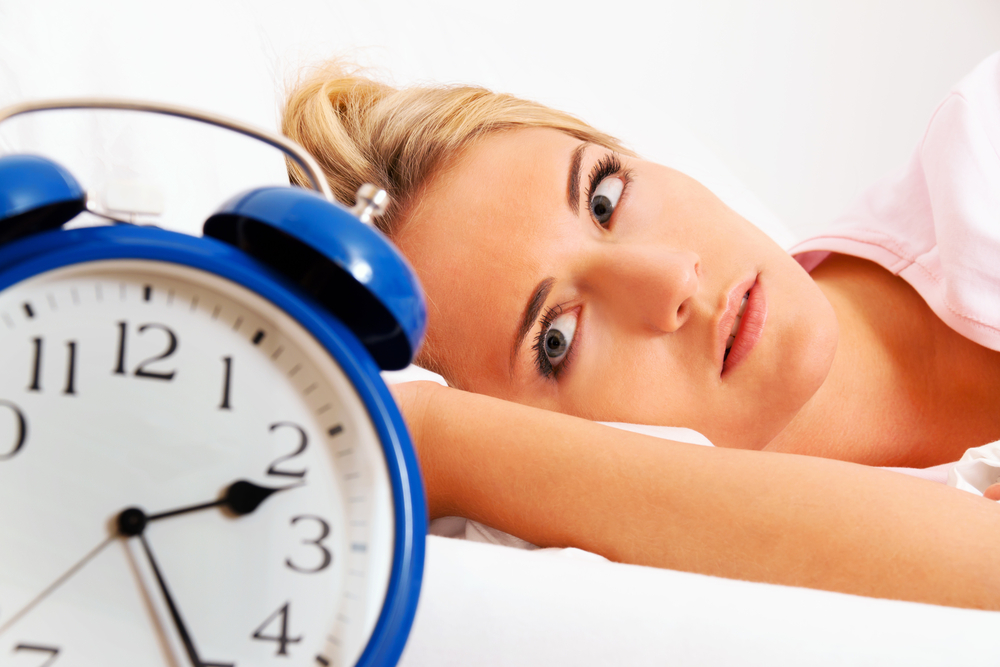
More Effective :-
Anulom-Vilom Pranayam
Shitali Pranayam
Shitkari Pranayam
Bhramari Pranayam
Om
Surya Namaskar
Savasana
Cautions:-
Do all your daily activities on time.
*************
Part -II
Advanced Yoga Course
Type of Pranayam :-
Type of Aasan:-
Shitli & Sitkari
Steps:
In Sitkari, first join your teeth together then keep your tongue behind the joint of your teeth, now breathe in from your mouth deeply and then slowly exhale through your nose. You can continue this process for 5-10 times.
Benefits: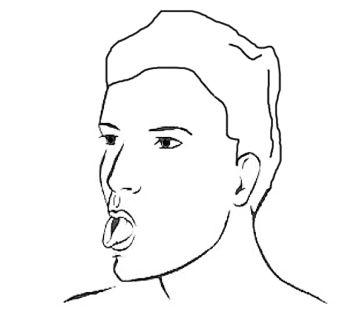

It helps to cool your body system.
Also effective for eye problem.
Cures acidity.
Good for hypertension & high blood pressure.
It cures dental,mouth & tongue problems .
Cautions :
Avoid if suffering from cold, cough,tonsils etc,This pranayam should not to be practise in winter seasons.
_____________________________________________________
Bahya
Steps:
Take a deep breath and exhale completely (breath out) to evacuate lungs as much as possible.Hold your breath and touch your chin to the chest.By pulling your stomach in and up under the rib cage such that the stomach and back seem to touch each other from inside.Lift the muscle from groin area.Hold as per your comfort.
Benefits: 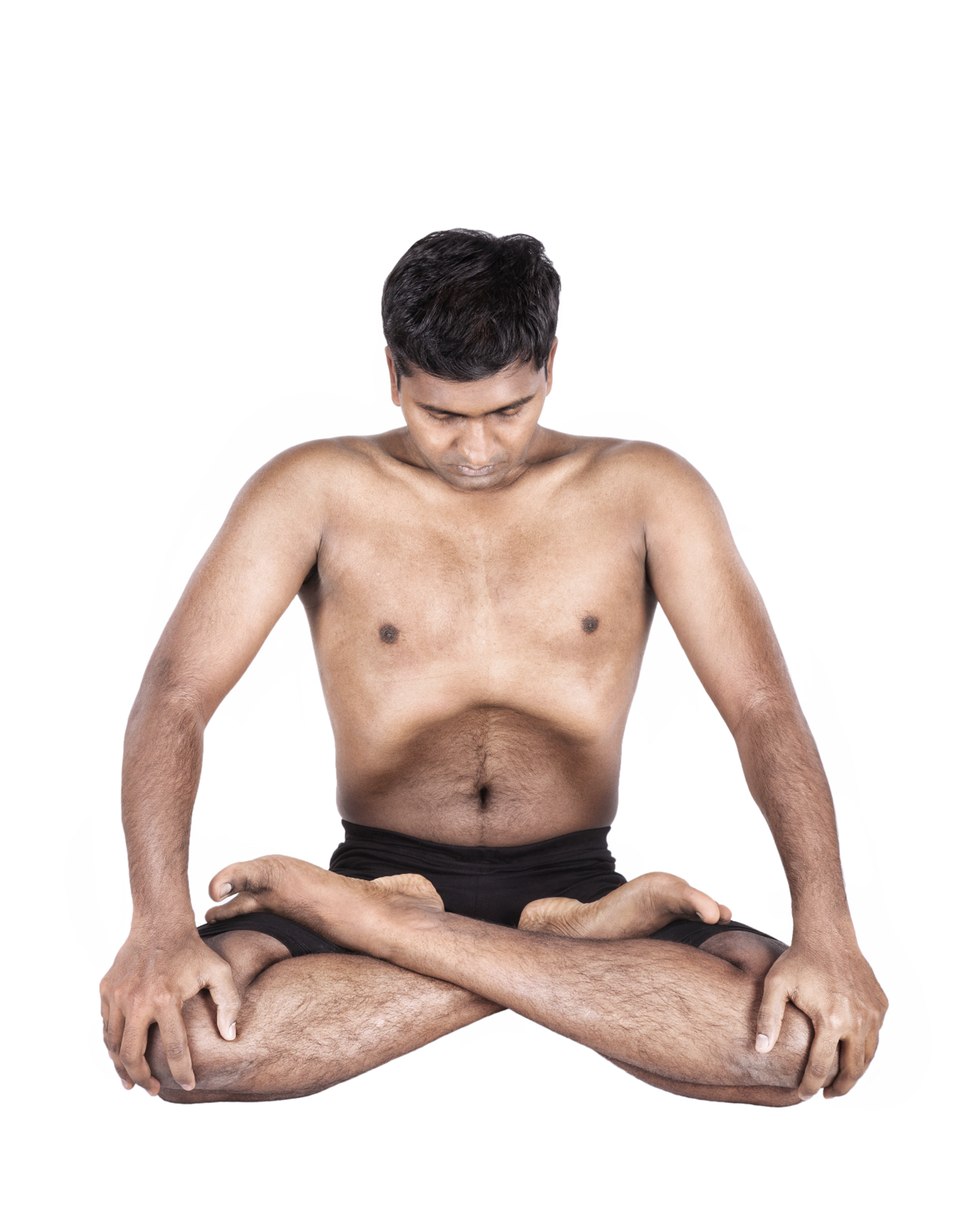
Bahya pranayama is beneficial for all abdominal problems .
It cures constipation,irregular stools, heartburn etc.
It also works well on hernia, urinary diseases, prostate problems,
Uterine prolapse and blocked fallopian tubes.
Bahya pranayama is also known to work well towards better
management and cure of all types of Diabetes.
It's good for gas problem and acidity .
Cautions :
Pregnant Women should completely avoid it. People with heart disease and Hypertension should do it under expert supervision.
Agnisar
Steps:
Sit in Padmasana OR Sukhasana and keep the hands on the knees in a comfortable position,Exhale the breath outside and Stretch both the hands straight and keep them on the knees with slight pressure. Contract and expand the stomach ,Try to touch the navel deep inside the stomach,Keep the stomach and hands normal before doing poorak i.e.,inhale. Now take deep, stable and slow breathe,This is one cycle of Agnisar pranayama. In one cycle contract and expand the stomach at least ten times,Increase the number to 25-30 times as per your capacity. 
Benefits:
Helps in increasing internal energy and vitality.
Cures constipation and gastric disorders.
Overcomes laziness, disinterest and strengthens the internal organs.
This pranayama cures asthma, tuberculosis and other serious diseases.
Cures sleepiness and circulates inner energy.
Cautions :
Pregnant Women should avoid this pranayama.People with heart disease and Hypertension should do it under expert supervision.
______________________________________________________
Ujjayi
Steps:
Sit in any Cross legged position like padmasana OR sukhasana in which the body can be relaxed and spine is erect, Now start creating hissing sound with breathes, this sound is produced by contraction of throat Or you may contract the throat and make frictional sound,Do it for few seconds inhale through both nostrils while creating Ujjayi sound and exhale for through both nostrils creating sound, this can be practiced for about 5 minutes,With practice one can increase the counts to 5-10 times.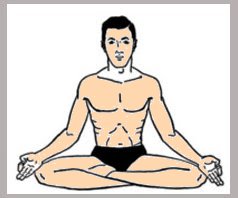
Benefits:
Cures psychosomatic diseases and stress related issue.
Calms the nervous system.
Helps bring down blood pressure & heart beats.
Cautions :
Pregnant Women should completely avoid it, People with heart disease and Hypertension should do it under expert.
Kandrasan ( Setu bandhasana )
Kamarchakrasana
Pawanmuktasana
90 Degree
Naukasan
Crunch
Circle
Cycling
Makarasana
Bhujangasana
Ardha Bhujangasana

Salabhasana
Dhanurasana
Part - III
Advanced Yoga Course
Type of Pranayam :-
Type of Aasan:
Sitting postures
Standing postures
********
Pranayam
Kevli Pranayam
Steps :
Take a deep breath and hold the breath inside for as long as comfortable. Then exhale and hold breath outside as much as possible this is constitute as one round of kevli pranayam.Between the rounds, rest for a while, till the breathing comes back to normal.
Benefits :
Increases lungs capacity and cures all breathing related diseases like asthma and sinus.
Increases intelligence and sharpness of mind .
Help to gain stillness of mind.
Help to deal with everyday stress and tension.
Cures all nervous system related diseases.
________________________________________________________________________________
Benefits:
Surya Bheda Pranayama activates the body and the bodily functions.
It increases the digestive fire.
It destroys all diseases that are caused by insufficiency of oxygen in the blood.
Very beneficial for people suffering from low blood
Very effective for stress management.
Very effective for depression, low energy.
Cautions:
People suffering from heart disease,high blood pressure or epilepsy should avoid this pranayam.
Chandra Bhedana Pranayama
Benefits:
Chandra Bhedana Pranayama is beneficial in conditions like mental tension, agitation, high blood pressure, heart disease etc.
Chandra Bhedana Pranayama is also useful for meditation.
The practice of Chandra Bhedana Pranayama reduces the flow of bile and as such the body heat is reduced.
Chandra Bhedana Pranayama helps cure heartburn and laziness.
Cautions:
This pranayama should not be done during winters,This pranayama should not be done by low bp patients
___________________________________________________________________
Jalandhara Bandha
Benefits:
In Jalandhara Bandha when we press the chin down on the jugular notch, the parathyroid and the thyroid glands in the neck get activated and Thyroxin is secreted. This hormone helps in reducing stress.
Jalandhara Bandha helps in controlling diseases of the thyroid gland.
Jalandhara Bandha gives peace and calmness to both, the heart and the mind.
Neck becomes long and beautiful
Voice becomes soft & sweet
This pose aids the Vishuddhi chakra, as per ancient wisdom. In turn, you become more efficient in expressing emotions and feelings.
Cautions:
Don’t try it if you are suffering from breathing problems, if you have either low or high blood pressure avoid this.
Uddiyana Bandha
Benefits :
It strengthens abdominal muscles and diaphragm.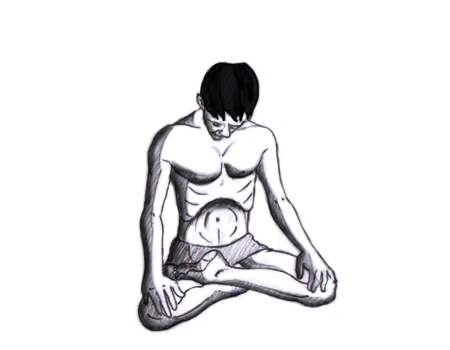
Increases Lungs capacity.
Massages abdominal muscles.
Improves digestion.
Purifies digestive tract of toxins.
Stimulates blood flow to brain.
Massages vital organs such heart stomach, liver,pancreas,kidneys,gall bladder and thus enhance their performance.
Cautions:
Persons suffering from stomach or intestinal ulcers should not perform this bandha. Hernia patients should not perform this bandh,should not be done during pregnancy and menstruation.
___________________________________________________________________
Moola Bandha

Benefits:
This bandh prevents piles.
Mood bandha improves the secretion of glands situated in the lower abdominal are of the body.
Moola Bandha improves concentration power.
Our nevers and breath are brought under control.
It removes the weakness of excretory organs and dispels with constipation.
It can help to relieve depression.
Cautions:
People suffering from hernia should not perform this bandha,woman suffering from gynecological problems should consult their doctor before performing this bandha,Practice mood bandha on an empty stomach.
Ashwini mudra
Benefits :
Ashwini mudra gives control of the anal muscles just like a horse.
Doing this mudra conserves the prana that moves down and escapes the body. With Ashwini mudra, the prana is turned upwards for spiritual purposes.
Ashwini mudra can be done in an inverted pose also. In this case it helps those suffering from piles and prolapse of rectum or uterus.
It helps to remove constipation.
According to Gheranda Samhita, the practice of Ashwini mudra can awaken the dormant Kundalini Shakti. It also removes all diseases of the rectum.
It gives strength and vigor and prevents premature death.
Strength of the muscles of the uterus. Useful in preventing the prolapse of the uterus and rectum and preventing piles.Strength of the muscles of the uterus. Useful in preventing the prolapse of the uterus and rectum and preventing piles.
Cautions:
Any women suffering from severe problems of the uterus should not practice this asana. Should be avoided during pregnancy and menstruation, high blood pressure and brain diseases. Should be avoided if suffering from an enlarged thyroid, spleen or liver as well as cervical spondylitis, slipped disc, headache and weak blood vessels in the eyes.
**********
Chakrasana/Eka Pada Chakrasana
Benefits: 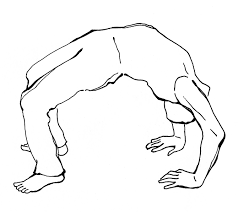
Chakrasana strengthens the back and abdominal muscles.
It tones the organs in the abdomen including the digestive, excretory and reproductive organs.
It gives a good shape to the body. It is good for those who have back problems and postural defects.
The more obvious physical benefits are those that derive from the stretching action. It stretches the lungs and chest, while strengthening the muscles of the buttocks, legs, calves, wrists, arms, and spine.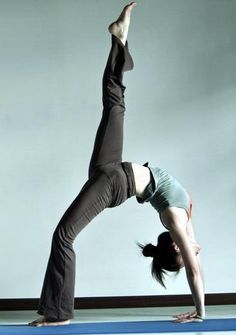
It acts as a natural stimulant for the thyroid and pituitary glands.
It helps re-energize you and is invigorating, and stimulating. It helps counteract depression.
This pose has therapeutic value and is recommended for back pain, infertility, asthma, and osteoporosis.
Cautions:
Avoid Chakrasana if you have recent chronic injury to legs, arms, buttocks, shoulders, back etc.Chakrasana should be avoided in cases of unmedicated hypertension or high blood pressure or detached retina.Chakrasana should not be practiced by people with heart problems.
__________________________________________________________________
Matsyasana
Benefits:
Stretches your deep hip flexors and intercostals (muscles between the ribs) 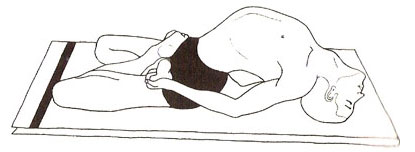
Relieves tension in your neck, throat, and shoulders
Stretches and tones the front of your neck and your abdominals
Stretches and stimulates the organs of your belly and throat
Strengthens your upper back and the back of your neck
Relieves stress and irritation
Therapeutic for rounded-shoulders, asthma, spasms in the bronchial tubes, and other respiratory issues
Cautions:
During pregnancy, this asana is to be avoided as it may places enormous strain on the womb especially if done incorrectly.If you suffer from serious lower back or neck injury, it is better to avoid this yoga posture
Supta Vajrasana
Benefits:-
This asana massages the abdominal organs alleviating digestive ailments and constipation.
It tones the spinal nerves, makes the back flexible and realigns rounded shoulders.
The nerves in the neck, the thyroid and parathyroid glands are particularly stimulated.
The ribcage is stretched and expanded fully, which helps to fill the lungs to its maximum capacity and bringing more oxygen into the system.
It helps boost self-confidence.
improve brain function and cognition and reduce anxiety and depression.
Caution:-
A person suffering from joint pain should not practice this asana.Don’t do this asana if you suffer from high blood pressure, slipped disc, vertigo or are pregnant or going through menstruation and suffer from back or knee injury.
__________________________________________________________________
Matsyendrasana
Benefits:-
Tones and strengthens abs and obliques.
Open the shoulders, neck, and buttocks
Increases flexibility, especially in buttocks and spine and help to cure neck and back pain
Improves digestion and elimination of wastes
Relieves symptoms of backache, fatigue, menstrual discomfort and sciatica
Stimulates liver, heart, lungs, kidneys and spleen
Releases excess heat and toxins from organs and tissues
Help to cure diabetes
Cautions:-
Should be avoided during pregnancy and periods.Heart problems patient and abdominal surgery should not practice this asana.Those suffering from severe spinal problems should not practice.should be done under expert guidance and consult a doctor before practicing any exercise.
Sarvangasana
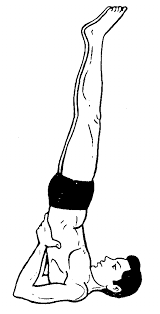
Benefits:-
It helps boost self-confidence.
improve brain function and cognition and reduce anxiety and depression.
It takes pressure off the heart, which has to work less to get blood flowing to the brain.
Helps with lung function by improving blood flow to the area, making it useful for people suffering from respiratory tract disorders.
Beneficial for thyroid related problems
Increases eyesight and very beneficial for ear related problems
Cautions :-
The asana should not be performed by those who have high blood pressure.Avoid this asana during menstruation.Having experiencing spinal problems, skip this asana.It should be avoided by those who have heart problems, middle ear problem, capillary, weak age, spondylosis, and Slip disc.
___________________________________________________________________
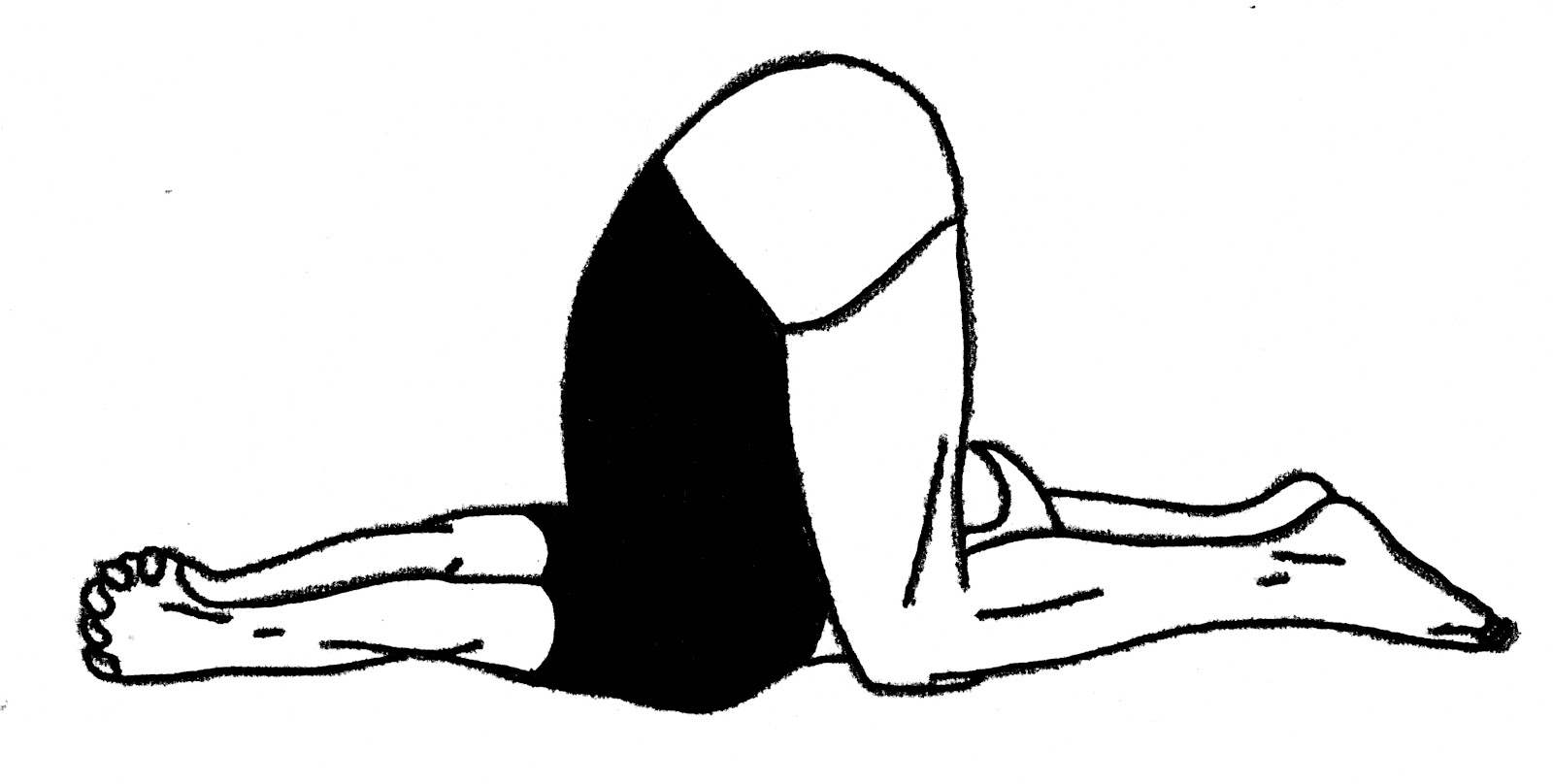
Benefits:-
Karnapidasana Stretches and strengthens your back bone.
Gives strength to the lungs and beneficial for asthma patients.
Stimulates the abdominal organs, and thyroid gland.
Reduce the symptoms of menopause.
Helpful in backache, infertility, sinusitis.
Good pose for internal abdominal massage to the organs.
Karnapidasana tones the buttocks, buttocks and thighs during stretching the shoulders and neck.
Cautions:-
Avoid this pose in case of diarrhea, Menstruation, neck injury, high blood pressure. In Asthma and high B.P. use props for supporting your legs.Consult yoga expert and doctor before starting any yogic activities
Savasana Pose
Benefits:
There is no muscle tension anywhere on your body.
There is no tension on your head and hair.
No tension on your face forehead, nose, cheeks, chin, ears.
There is no tension on your neck.
Remove the tension, if there is any, on your neck, shoulders, elbows,
wrists, palms, fingers.
Keep the muscles - of the stomach, abdomen, back - loose.
Relax the muscles of the thighs, knees, ankles, feet, toes etc.
Be at a relaxed position.
**********
Mudras
Hasta mudras
Hasta mudras mean hand gestures adopted during asana,pranayama and meditation that directs flow of energy into our body. According to the Tantras these mudra yoga techniques stimulate different areas of the brain. The natural sciences of Mudra therapy believe that the five fingers correspond to the five basic elements viz. Ether, Air, Fire, Water and Earth.
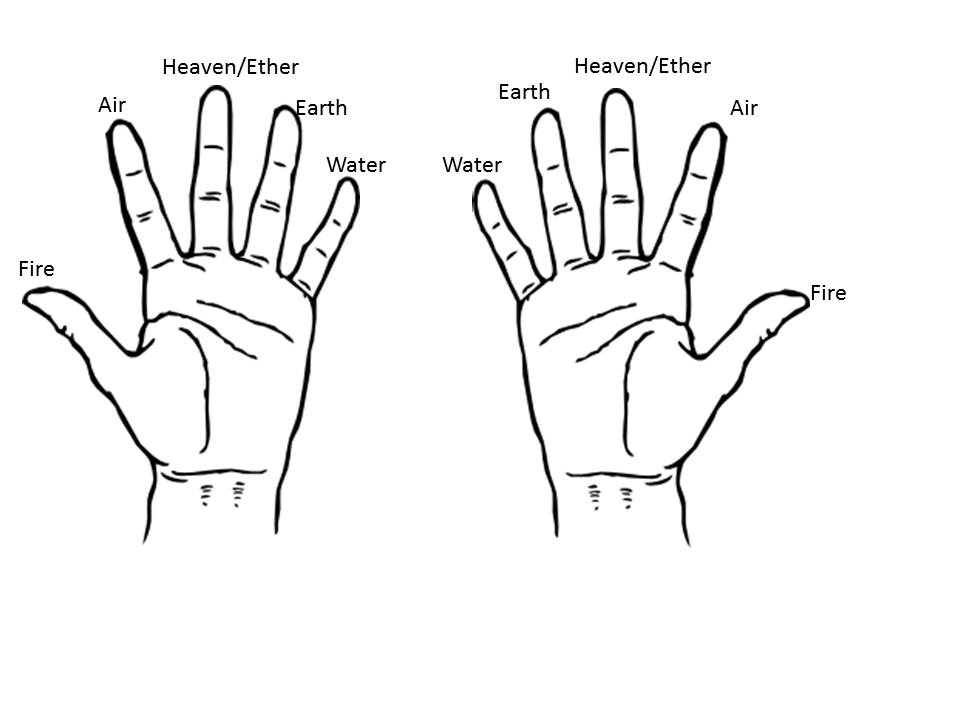
Thumb – The fire (Agni)
Index finger – The air (Vayu)
Middle finger – The ether (Akasha)
Ring finger – The earth (Prithvi)
Small finger – The water (Jala)
___________________________________________________________________
Apan Mudra
This mudra is made by joining the tips of the thumb, the middle finger and the ring finger keeping the other fingers straight.
Benefits:
Toxins are removed from the body and the body becomes pure.
It also relieves constipation, piles, diseases caused by vayu or air, is helpful in diabetes, stoppage of urine, kidney defects and dental problems.
It is beneficial in stomach and heart diseases and brings out perspiration.
___________________________________________________________________

Join thumb with Index fingers
Benefits:
Increase contractions.
Increases memory power.
Relax mind
Prana Mudra
Join thumb with little and ring fingers.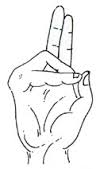
Benefits:
Strengthen the immune system.
Restores our energy reserves.
Improves breathing.
Good for the eyes.
Improves concentration power.
Controls our eating habits.
___________________________________________________________________
Prithvi mudra
The tip of the ring finger touches the thumb. Remaining fingers are to be kept straight but at ease.
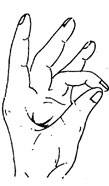
Benefits:
Balances the different elements inside of the body.
Strengthens the body and alleviates fatigue.
Opens the mind
Fosters self-confidence and belief in the self.
Helps those who are seeking spirituality.
___________________________________________________________________
Akash Mudra
The tip of the middle finger touches to the top of thumb. Remaining fingers are to be kept straight but at ease.
Benefits: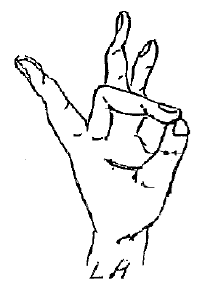
Develops intuition and extrasensory powers.
Detoxifies the body by the elimination of metabolic wastes.
Activates throat Chakra.
Purifies and emotions and thoughts.
Increases intuition power and alertness.
Beneficial for heart disease.
Here both hands are placed in Adi Mudra, then with the knuckles of both hands together, the hands facing upward are placed at the navel area and the flow of breath continued.
Benefits:
Increase contractions.
Increases memory power.
Relax mind
*******